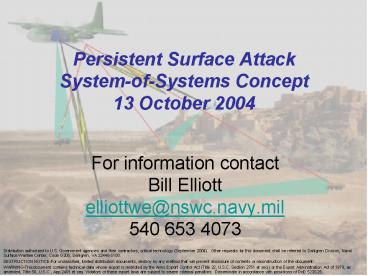Persistent Surface Attack SystemofSystems Concept 13 October 2004 - PowerPoint PPT Presentation
1 / 23
Title: Persistent Surface Attack SystemofSystems Concept 13 October 2004
1
Persistent Surface AttackSystem-of-Systems
Concept13 October 2004
- For information contact
- Bill Elliott
- elliottwe_at_nswc.navy.mil
- 540 653 4073
Distribution authorized to U.S. Government
agencies and their contractors, critical
technology (September 2004). Other requests for
this document shall be referred to Dahlgren
Division, Naval Surface Warfare Center, Code
G205, Dahlgren, VA 22448-5100. DESTRUCTION
NOTICE-For unclassified, limited distribution
documents, destroy by any method that will
prevent disclosure of contents or reconstruction
of the document. WARNING-This document contains
technical data whose export is restricted by the
Arms Export Control Act (Title 22, U.S.C. Section
2751 et seq.) or the Export Administration Act of
1979, as amended, Title 50, U.S.C., App 2401 et
seq. Violators of these export laws are subject
to severe criminal penalties. Disseminate in
accordance with provisions of DoD 5230.25.
2
SECDEF Challenge
- We need more weapon systems like the AC-130,
where the ordnance can be directed in a more
precise way
ATL Objective
Shorten the kill cycle without sacrificing
precision!
3
AoA Recommendations / Status
- SoA Manned
- Unitary Platform
- GTOW 170,000 lb
- Mission Payload 55,000 lb
- Max Range 4000 nm
- Max Endurance 10 hrs
- Crew 6
- SoA UCAVs
- Triplet of UCAVs
- GTOW 71,000 lb
- Mission Payload 17,000 lb
- Max Range 4000 nm
- Max Endurance 10 hrs
Air Force Investigating Multi-Mission (AMC-X,
M-X, B-X, PSAS) Common Modular Platform
Opportunities
4
Concept of Operations
PSAS OV-1
5
Enabling Technologies
- Common Operating Picture and Control (COPaC)
- Theater-Wide Situational Awareness
- Execute F2T2EA
- Automated Mission Planning
- Reduced Manning
- Stand-Off Precision Guided Munition (SO-PGM)
- Weapon
- Launcher
- Effectiveness
- Air Launched UAV (Assessing ISR Technologies)
- C-130 Sensors
- UAV Sensors
- FO Sensors
- BDA Technologies
- UVCS Technologies
6
Common Operational Picture and Control(COPaC)
7
COPaC Attributes
- Networked
- Provides Theater-Wide Situational Awareness
- Interoperable with Indirect Fires Through
Networked TADLs - Automated Mission Planning
- Open Architecture Computing Environment (OACE)
- Human-Centered Design
8
Gunship Crew
- Todays aircrew 15-18
- Pilot
- Co-Pilot
- Navigator
- Flight Engineer
- Loadmaster
- Fire Control Officer
- Electronic Warfare Operator
- Two Sensor Operators (IR TV)
Tomorrows Vision 5-6 Operators (Notional
Positions)
- Lead Gunner
- Airborne Gunners
- Scanners
- Aircraft Commander
- Co-Pilot
- Defensive Systems Operator
- Attack Coordinator
- 2 Sensor / Weapons Operators
9
Intelligence, Surveillance, Reconnaissance(ISR)
10
Sensor System Terms of Reference
- Detect
- Somethings there
- Distinguish objects from background scenery
- Recognize (Resolve)
- Distinguish between classes of targets, e.g.
- Tank vs. APC
- Positive Combat Identification
- Distinguish between makes/models of one class of
target (i.e., friendly vs. enemy), e.g. - T-72 vs. M1A2, BMP-3 vs. M2
- Requires significant target detail
TARGET Through SENSOR to DISPLAY and OPERATOR
11
Sensors
- SOF Team Deployable (Networked)
- Small, Rugged Packages with Limited Capability
and Lifespan - Gunship Sensors (Networked and Organic)
- High G Packages with Rapid, Long Range
Capability, Low Resolution - Low G Packages with Persistence and Medium
Resolution - Integrated Packages with State-of-the-Art, Ultra
High Resolution - In-Theater Assets
- GIG Sensors, NRO, Global Hawk, Predator, etc.
12
Battle Damage Assessment
- Phases
- Phase 1 Did the Weapon Get to the Target and
Function ? - Phase 2 Was the Desired Effect Achieved ?
- Phase 3 Target System Response (Power Grid,
Transportation, Infrastructure,) - Technologies such as
- 81-mm Mortar (ARL-NSWC)
- MDBDA (Air Force)
- 105-mm Projectile (Diehl)
- Bomb Pursuit Vehicle (AFRL/MN)
Key Aspect of the Kill Chain Process
13
GunshipUAV / UAV Sensors
UAV Control System Implemented via Stanag 4586
Architecture
PSAS Objective is Level IV
14
Weapon System
15
Weapon System Studies
PSAS WEAPON - MUNITIONS FLYOUT STUDIES
PSAS WEAPONS - LAUNCHER STUDIES
SEPARATION
RANGE
GUN
DISPENSE
CANISTER
Global (Aircraft) X, Y, Z Local (Launcher) X,
Y, Z Launcher Azimuth ?? Launcher
Elevation ?? Munition Azimuth ?m
16
PGM Fly-Out Studies
- Objective Assessing how Launcher Positions /
Orientations Impact Munition Safe Separation,
Stable Flight, and Maximum Range - Assessing Two Classes of PGMs Versatile
Canister- Launched Munition (VCM
Powered)Versatile Dispense- Launched Munition
(VDM Glider)
Range Plot
17
Weapon SystemPrecision Guided Munitions
Versatile Canister-Launched Munition (VCM)
PGAP/ERX
Precision Guided Mortar Munition
(PGMM) RAZORBACK (LM)
Low Cost Precision Kill (LCPK) Solution
SO-PGM / Viper Strike
57mm BOFORS Round
ERGM
Versatile Dispenser Launched Munition (VDM)
120mm PGMM Munition
Assessing Various Government and Contractor
Technologies / Concepts
18
Weapon SystemLauncher Concepts
- Classed by Pointing Mechanism
- Fully Rotating andElevating, Stabilized
- Limited Pointing,Stabilized
- Fixed
Focus is Integrated (Cabin Pressurization)
Autoloader Concepts
19
System-of-Systems DemonstrationProgram Overview
- Objective Demonstrate that PSAS Enabling
Technologies can be Successfully Integrated into
a Combat System to Execute Multiple Engagements /
Beyond Visual Range F2T2EA Kill Chain Events - Enabling Technologies are
- COPaC
- Standoff Precision Weapon
- Air Launched UAV ( ISR)
- Propose to Conduct Two System-of-System Exercises
- Manned Exercise
- Unmanned Exercise
20
Manned Platform (Nighttime Exercise)
Simultaneously Engage All Targets Direct and
Indirect Fire Scenarios
21
Unmanned Platform (Daytime Exercise)
Moving Target Provides the Best Stressing Scenario
22
Summary
- System-of-Systems Demonstration will Validate
that the PSAS Enabling Technologies when
Integrated into a Combat System will Meet the BVR
/ Simultaneous Target Engagement and Deliver the
Required Effects on Target
23
Contact Information
Bill Elliott elliottwe_at_nswc.navy.mil 540 653 4073































